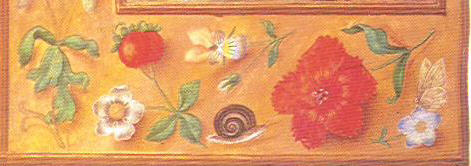THE APOSTLE TO FRISIA
c.675 - 754
"Let us never be dogs that do not bark, or silent bystanders, or hired servants who flee at the approach of the wolf. Instead let us be watchful shepherds, guarding the flock of Christ. And as God gives us strength, in season and out of season, let us preach to the powerful and powerless alike, to rich and poor alike, to all people of every rank and of whatever age, the saving purposes of God."
Born c. 675 in Crediton, Devon, and baptised as Wynfrith, he took the name Boniface when he entered the Benedictine monastery at Exeter and then at Nursling, Winchester. After he was ordained at 30 he did not want a safe ecclesiastical career in England but sought most earnestly to be a missionary in some heathen part of Europe. Thus in 716 he set out to join Willibrord, another Englishman from Northumbria, in Frisia, but the political situation aborted this attempt, and he was forced to return to his monastery. With the death of the abbot of his community upon his return, Boniface was elected to take his place, but he refused, knowing his calling was for missionary work. As a result in 718 he travelled to Rome where Pope Gregory II commissioned him to preach to the pagans in Teutonic lands.
"You are to go forth to preach the word of God to those still enslaved in paganism. You are to instruct them in the service of God's kingdom by persuading them to accept the Truth in the name of Christ, our Lord and God. You will imbue them with the Old and New Testaments in a spirit always of love and moderation, and in a manner of argument appropriate to their comprehension." How very similar are these words to those given by Gregory the Great to Augustine.
Having succeeded in Hesse, Boniface moved on to Thuringia. Although there were some Christians living here, Boniface asked English monks and nuns to join him as missionaries to Germany. For the rest of his life, he relied heavily on the support of his friends and thus for many years parties of monks and nuns crossed the sea to place themselves at the disposal of Boniface who established a missionary centre at Thuringia. English monasteries sent books and vestments for the new centres. Two existing monasteries were enlarged and new ones founded to accommodate all the missionaries. Among their numbers were Saint Lull, who succeeded Boniface in the see of Mainz; Saint Eoban, who shared Boniface's martyrdom; Saint Burchard, the first bishop of Würzburg; Saint Wigbert, abbot of Fritzlar; Saint Thecla, first abbess of Ochsenfürt Abbey; Saint Walburga, sister of Saints Willibald and Winebald; and Boniface's beautiful and erudite young cousin, Saint Leoba, who supervised all the convents founded from the monastery of Bischoffsheim.
In 731 Boniface was sent the pallium by Pope Saint Gregory III and constituted metropolitan of Germany beyond the Rhine [later see of Mainz]. He was authorized to create new sees and went to Bavaria to organize a church hierarchy and establish new sees. He became a mentor and support to the Carolingians, and he reformed the Frankish Church, which Charles Martel had plundered. Boniface made a third journey to Rome to report on the progress being made. At that time he was appointed papal legate and recruited Saint Willibald at Monte Cassino. Returning to Bavaria as papal legate, Boniface organized its hierarchy, weeded out unworthy priests, and corrected abuses. Then he continued on with his missionary work, founding other sees at Erfurt for Thuringia, Buraburg for Hesse, and Würzburg for Franconia. Later he established a seat in Nordgau at Eichstätt.
The year 741 was a fruitful one. Boniface founded the abbey of Fulda with his young disciple, Saint Sturmi, and Charles Martel died, leaving the way open for Boniface to work with his successors, Pepin and Carloman. As the latter was earnestly devout, he co-operated with Boniface to call a synod to deal with abuses. The first was followed by a second in 743. Pepin summoned a synod for Gaul, which was succeeded in 745 by a general council for the two provinces. Boniface presided over all of them and succeeded in carrying out all the reforms he felt were needed. Fresh vigour was infused into the Church of Gaul. After the fifth Frankish council in 747, Boniface fixed his metropolitan see at Mainz and Pope Saint Zachary created him primate of Germany as well as apostolic legate for Germany and Gaul. Soon after this Carloman retired into a monastery and Pepin united Gaul under one rule; however, he continued to give Boniface the supported he needed. As papal legate Boniface crowned Pepin at Soissons in 751.
Boniface's impact on English history and church was enormous, extending beyond the simple conversion of people to Christianity. He became the great exemplar and as such sustained the next generation of missionaries, many of whom were his spiritual children. Even in England some of his pupils held high office, including Eanbald who became Archbishop of York.
During his life he formed very close relations with Eadburga, abbess of Minster-in Thanet who constantly supplied him with books and vestments and altar plate and also with Leoba, abbess of Fulda. She was distantly related to Boniface. Just prior to his death, Boniface charged her never to leave Germany, and instructed that she should be buried beside him at Fulda.


